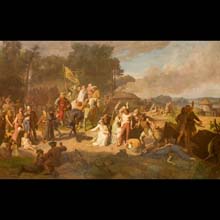
material: oil on canvas
dimensions: 290 × 460 cm
description: Gerson regarded some of his artistic activities as a duty to his country and development of art, and he believed that doing history paintings was his patriotic mission. The artist began to paint more and more patriotic scenes after the January Uprising and the medal success of Jan Matejko at the Salon in Paris in 1865 for Skarga’s Sermon. The Lamentable Apostolic Mission was a kind of healthy artistic rivalry with the Krakow master. A huge size of the canvas, the subject matter devoted to a momentous event conveying historiosophic and heroic meanings and not an anecdotal treatment show that Gerson aimed to execute a history painting following the highest academic standards. Using groups of people in a wide landscape with great skill, the painter depicted a scene from a period of conquering pagan Polabian Slavs by Christian Germanic tribes, who justified their violence and plunder on the grounds of the Christianizing mission. In a later time, critics tried to set this scene in the 10th century, identifying the figure of the German leader with Gero, a margrave of the Eastern March. Barbara Ciciora
exposition: The Gallery of 19th Century Polish Art in Sukiennice,
The Cloth Hall, 1, Main Market Square
key: Around the academy >>>
dimensions: 290 × 460 cm
description: Gerson regarded some of his artistic activities as a duty to his country and development of art, and he believed that doing history paintings was his patriotic mission. The artist began to paint more and more patriotic scenes after the January Uprising and the medal success of Jan Matejko at the Salon in Paris in 1865 for Skarga’s Sermon. The Lamentable Apostolic Mission was a kind of healthy artistic rivalry with the Krakow master. A huge size of the canvas, the subject matter devoted to a momentous event conveying historiosophic and heroic meanings and not an anecdotal treatment show that Gerson aimed to execute a history painting following the highest academic standards. Using groups of people in a wide landscape with great skill, the painter depicted a scene from a period of conquering pagan Polabian Slavs by Christian Germanic tribes, who justified their violence and plunder on the grounds of the Christianizing mission. In a later time, critics tried to set this scene in the 10th century, identifying the figure of the German leader with Gero, a margrave of the Eastern March. Barbara Ciciora
exposition: The Gallery of 19th Century Polish Art in Sukiennice,
The Cloth Hall, 1, Main Market Square
key: Around the academy >>>












